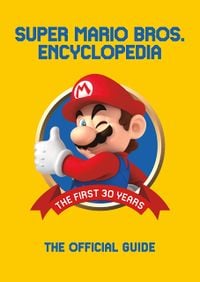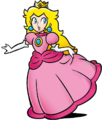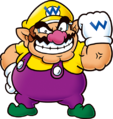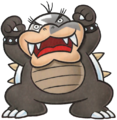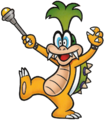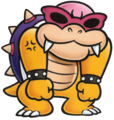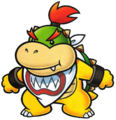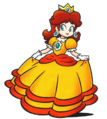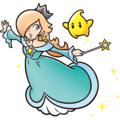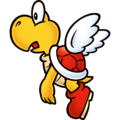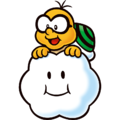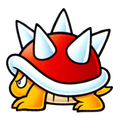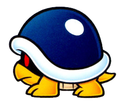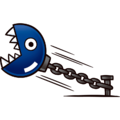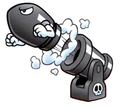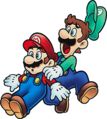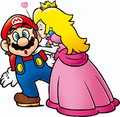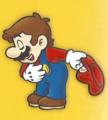Super Mario Bros. Encyclopedia
The Super Mario Bros. Encyclopedia (full title: Super Mario Encyclopedia: The Official Guide to the First 30 Years), also known as Encyclopedia Super Mario Bros. and originally known as [Nintendo Official Guide Book] Super Mario Bros. Encyclopedia 30th Anniversary 1985–2015,[1] is an encyclopedia that was released in Japan on October 19, 2015, as part of the celebration of the 30th anniversary of Super Mario Bros. The book covers characters, enemies, power-ups, items, stages, techniques, and graphics from all 17 titles in the main Super Mario series up to Super Mario 3D World,[2] as well as developer interviews, concept art, well-known glitches, and level design explanations.[3] It contains 256 pages.
This book was supposed to be translated in English and released in North America and Europe by Dark Horse Books on June 15, 2017,[4] although preorders for the English translation were canceled in May 2017,[5] and the release date had been moved to October 23, 2018.[6] However, the date was later modified again, this time on October 16.[7] The book's German translation was released on October 12, 2017, by Tokyopop;[8] its French translation was published on July 4, 2018, by Soleil Productions in the Soleil Manga collection;[9][10] its Italian translation was published on November 15, 2018, by Magazzini Salani;[11][12] and its Spanish translation was released in October 2017, by Planeta Cómic.[13]
Contents
The book begins with a few introductory pages, followed by a table of contents that details the topics covered in the encyclopedia. The work covers the following subjects, in the following order: "Super Mario 30-Year Series Timeline," "Meet the Mario Family!", Super Mario Bros., Super Mario Bros.: The Lost Levels, Super Mario Bros. 2, Super Mario Land, Super Mario Bros. 3, Super Mario World, Super Mario Land 2: 6 Golden Coins, Super Mario 64, Super Mario Sunshine, New Super Mario Bros., Super Mario Galaxy, New Super Mario Bros. Wii, Super Mario Galaxy 2, Super Mario 3D Land, New Super Mario Bros. 2, New Super Mario Bros. U, Super Mario 3D World, and "Every Game in which Mario Makes an Appearance." Additionally, the table of contents includes extra content such as "The Mario Family's Spin-off Games," "Mario's Sports Game History," "Super Mario Series Flyer Gallery," "The History of Super Mario Series Remakes," "Anniversary Events," and "Mario Before He Was Super."
Plagiarism
Following the release of the encyclopedia in English, it was found that one of the translators had taken conjectural and foreign names for characters from fan websites such as the Super Mario Wiki and Fandom's MarioWiki. This especially concerns enemies and characters from Super Mario Land 2: 6 Golden Coins, as well as others such as Winged Strollin' Stu (dubbed by the book by its former conjectural name used on the Super Mario Wiki, "Soarin' Stu") and Lumacomète, which is actually the character's French name, used by the Super Mario Wiki at one point due to a lack of an English name.[14]
List of English translation errors and typos not from the Super Mario Wiki
- On page 11, the book uses edited Japanese artwork from Super Mario Maker that changes the release years to the years that the games were released in the West with the exception of Super Mario Bros.: The Lost Levels. Because of this, the artwork erroneously places Super Mario Bros. 2 in front of Super Mario Land, Super Mario Bros. 3, and Super Mario World despite Super Mario Bros. 2 releasing before those games were released in the West. Super Mario Land is also placed in front of Super Mario Bros. 3 despite Super Mario Land releasing earlier in the West. These errors are fixed on page 13.
- On page 15, all of the Koopalings use only their first names except for Wendy O. Koopa, who uses her first and middle names, and Ludwig von Koopa, who uses his full name.
- A character overview for New Super Mario Bros. describes Toad as a single character, rather than the multiple Toads shown fleeing Peach's Castle.
- The English translation states that the POW Block debuted in Super Mario Bros., which is not true as it debuted in Mario Bros., with its Super Mario series debut being Super Mario Bros. 2.
- On page 25, the English translation erroneously states that the first unmodified American release of Super Mario Bros.: The Lost Levels was the Wii U's Virtual Console release in 2014, despite that title actually going to the earlier Wii Virtual Console release in 2007.
- On page 25, in the paragraph about Super Mario Bros.: The Lost Levels' story, the book claims that "*This text is translated from the Japanese instruction booklet." However, the story includes a reference to Princess Toadstool in the second paragraph, which changes to "Princess Peach" in the third.
- On page 28, the paragraph about World 9-3 claims that the only enemies in the level are Blue Bowsers, despite there being only one.
- On page 44, Pipe Cannons are called Gina Cannons. Additionally, the descriptions of them and the rest of the Super Mario Land enemies use a corruption of the original names from Nintendo Power guides as opposed to their manual romanizations.
- On page 45, this is stated under "A Hidden World": "After Mario defeats Tatanga, the Mushroom Castle on the title screen turns into a Mario Castle and he can enter a world with a lot more enemies than before." This is a mistranslation—the word should be "Cursor," not "Castle."
- On page 51, the Blooper Nanny that fires Bloober Babies is called a "Scatter Bloober," which is supposed to be "Scattering Bloober."
- On page 51, the Fiery Walking Piranha is called a "White Piranha," one of Nipper Plant's alternate names. It is referred to using plural pronouns despite only a single Fiery Walking Piranha appearing in the game.
- On page 64, the book refers to Para-bombs as Para-Bob-ombs and Spike Tops as Red Spike Tops.
- On page 68 of the Japanese version, the enemies 「ハックンA」 and 「ハックンB」 have their names swapped. This is corrected in the English version under the names "Ninji 1" and "Ninji 2" on pages 35 and 36, respectively.
- On page 68 of the English version, it is stated that Ice Blocks can be broken with a spin jump. This is a mistranslation—it should state that Ice Blocks cannot be broken with a spin jump.
- On page 71, the book incorrectly refers to Wigglers as "Wrigglers" twice before correctly referring to them as Wigglers in the same paragraph. On page 86, the Wiggler is incorrectly called a Wriggler again.
- On page 71, when the book describes Super Mario World's perfect score, there is an image of a zoom-in of an image of the Japanese version's title screen showing the perfect score of 96. However, the actual image of the title screen that is being zoomed in has three empty save files with no score, and is shown on the North American version.
- On page 77, the levels Roots Course and Tree Trunk Course have their names swapped. This mistake is present in the Japanese version and other translations as well.
- On page 78, the book incorrectly gives the name "Fire Piranha Plant" to the Piranha Plant statue.
- On page 85, Ukkikis are referred to as one character, despite two appearing in Super Mario 64. This is fixed on page 86.
- In the Super Mario 64 section, the Wiggler is treated as the generic enemy rather than an individual, using plural tense and stating that Wigglers are angry when Mario stomps them. In actuality, the Wiggler is a boss found on Tiny-Huge Island.
- On page 91, the Work Elevator is incorrectly called a Directional Lift.
- On page 93, Snowman's Land is incorrectly called "Snowman's Mountain."
- Sparkies do not appear in the Super Mario 64 section of the book.
- On page 101, the Buckies are referred to as "The Packees," which is a misreading of the Japanese dakuten as handakuten. In addition, the characters are individually named with the direct romanizations of "Mai-Mai," "Miru-Miru," and "Maki-Maki," instead of the game's localizations of Ducky, Plucky, and Lucky.
- On page 119, "Red Ring" is not capitalized.
- On page 128, Pulse Beams are called Ring Beams.
- On page 128, Montys are incorrectly called Monty Moles.
- On page 134, the book incorrectly refers to Eye Beamers as "sentry beams."
- On pages 145 and 195, in the "enemies" sections for New Super Mario Bros. Wii and New Super Mario Bros. 2, respectively, Climbing Koopas are listed as "Climbing Koopa (Green)" despite red Climbing Koopas not being listed in those sections and not being in those games.
- On page 148, the description for the final course states: "Mario and his friends cross the Bone Lifts over the lava to get to its deepest depths." The next page inconsistently refers to that object as a "BONE PLATFORM."
- On page 149, the description for W9-3 states: "On this course, Banzai Bills and Bull's-Eye Banzais come one after the other." It should mention Bull's-Eye Bills (or Missile Bills), not Banzai Bills.
- On page 159, "Digga-Leg" is unhyphenated.
- Stone wheels do not appear in the Super Mario Galaxy 2 section of the book.
- On page 174, the "You've Got Mail" and "A Visit from Rosalina" captions are swapped.
- On page 194 of the Japanese version, the Grinder obstacle has the description: 「刃を回転させながらルール上を移動している。大きなタイプもある。」 (They spin their blades as they move on their rule. There is also a big type.). 「ルール」 (rule) is a typo of 「ルート」 (route). This is corrected in the English version.
- The purple variants of Dragoneel do not appear in the New Super Mario Bros. U section of the book.
- On page 219, a sentence below "Play During the Credits" reads: "They can jump or lift up the other characters or even collect the coins than the Baby Yoshis spit out." The word "that" should be used in place of "than."
- On page 224, the screenshot for the ? Box actually depicts a Propeller Box.
- On page 226, "Fizzlit" is misspelled as "Fizzlet." On page 159, "Fizzlit" is correctly spelled.
- On page 229, the icon shown for Captain Toad Makes a Splash is the one for a Mystery House instead of that of a Captain Toad course.
- On page 236, the first Warp Zone in Super Mario 3D World is erroneously stated to be found in Conkdor Canyon (World 2-1), when in reality it is found in Koopa Troopa Cave (World 1-2).
- On page 241, under "EARTHBOUND," it is stated that "If the player allows the game to suggest a character name, options such as Mario and Luigi come up." While this is technically true for the Japanese version, Mother 2, the English localization of the game changes the Super Mario references to unrelated names.
- On page 245, under "DENSETSU NO STAFY 3," it is stated that "Mario appears during a stage." In actuality, this is Wario, which is mentioned correctly in the Japanese version.
List of English translation mistakes and names from the Super Mario Wiki
- Page 44: A Genkotsu is known as a "Pipe Fist," which was a conjectural title from 2015 to 2018. The wiki reverted to this title in a 2022 proposal.
- Page 55: A tornado is known as a "Tweester" in the Super Mario Bros. 3 section, which was conflated by the wiki from 2006 to 2017. The same oddity exists in Prima Games' Playing with Power: Nintendo NES Classics.
- Page 63: A Jumping Fire Piranha Plant is known as a "Fire Jumpin' Piranha," which is based on the wiki's conjectural "Fire Jumping Piranha" title from 2015 to 2018.
- Pages 75 and 76: With the exception of "Fireball Boy," nearly every enemy name from Super Mario Land 2: 6 Golden Coins is directly lifted from the wiki titles, with macrons removed from romanizations where applicable. This includes "Be" and "Bomubomu," which went under the names B Fly and Bomubomu 1 2 3, respectively, in the Japanese version. This is similar to what was done to enemies that had not had their names localized (or had not had their localized names discovered) from Zelda II: The Adventure of Link in Dark Horse's book The Legend of Zelda: Arts & Artifacts. Additionally, "Ant" was a general term and "Bibi" had a name in Nintendo Power, leading both articles to be retitled in 2019. Most of these names would later appear on the English Mario Portal website.
- Page 78: A Moneybag is known as a "Money Bag," which was an unsourced title from 2007 to 2017.
- Page 85: In the Super Mario 64 section, the "Boss Bass" entry states that it is also known as "Bubba" in the description, which is not mentioned in the Japanese version. With current information, Cheep Chomp is considered to have had the alternate name Bubba, with Boss Bass being the name of a previous, similar iteration of Big Cheep Cheep, although Cheep Chomp is referred to as Boss Bass in Yoshi's Island DS.
- Page 86: A Moneybags is known as a "Moneybag" in the Super Mario 64 section only, which was the name used by the wiki from 2009 to 2018. This name would later appear on the English Mario Portal website.
- Page 92: A chair is known as a "Killer Chair," which is a translation of an unofficial Japanese name styled after Killer Book and Killer Piano. In the book, the latter two are listed among enemies, while the former is listed among "Items & Obstacles." Additionally, it has a completely different name in the Japanese version of the book (Poltergeist).
- Page 92: A flame thrower is known as a "Kuromame," which is a romanization of an unofficial Japanese name used by the wiki from 2011 to 2017. The Japanese version of the book uses the name Keronpa Ball, which is based on the enemy's appearance as Keronpa in Super Mario 64 DS.
- Page 99: The Electro-Koopa King is known as "Electro-Koopa (green)," which was a conjectural title from 2015 to 2019.
- Page 100: A Winged Strollin' Stu is known as a "Soarin' Stu," which was a conjectural title from 2007 to 2017.
- Page 101: The captain at Ricco Harbor is known as the "Pianta Captain," which was a conjectural title from 2007 to 2019.
- Page 101: The Noki grandson is known as the "Noki Elder's Grandson," which was a conjectural title from 2010 to 2019.
- Page 105: The electric goop is known as "Electric Graffiti," an Orange Juice Generator is known as a "Forcefield," and the burning goop is known as "Lava Graffiti," which were conjectural names in the graffiti article from roughly 2008 to 2019.
- Page 119: A floor is known as an "orange platform," which was a conjectural name in the World 2 article from 2008 to 2013 and subsequently the World 2-2 article from 2013 to 2022.
- Page 119: A face block is known as a "Platform Block," which was an unsourced title from 2009 to 2019.
- Page 119: A Blue Coin is known as a "Silver Coin" in the New Super Mario Bros. section, which was the case in the Silver Coin article until a 2018 proposal.
- Page 126: Comet Luma[derived] is known as "Lumacomète," which was a French name used as the article title from 2012 to 2018 that was briefly changed in 2014 and 2015.
- Page 127: A Spoing is known as a "Bouncing Scuttlebug" in the Super Mario Galaxy section only. This is a remnant of when Spoings and Spanglers were erroneously considered Scuttlebugs by the wiki, which was settled via a 2012 proposal that was mistakenly neglected until 2018.
- Page 127: A Bonefin is known as a "Fish Bone." The wiki considered them the same thing despite different appearances and Japanese names until a 2018 proposal.
- Page 128: A Spangler is known as a "Sprangler" in the Super Mario Galaxy section only. The wiki had this typo from 2012 to 2024.
- Page 128: A bat is known as a "Swoop" in the Super Mario Galaxy section only. The wiki considered them the same thing despite different appearances and Japanese names (but with basis within internal data) until a 2017 proposal.
- Pages 127 and 159: A Small Chomp is known as a "Chibi Chomp." This is an unofficial localization of its alternate Japanese name (Chibi Wanwan) that was used as the wiki title from 2016 to 2017.
- Pages 127 and 159: A Fire Pressure is known as a "Fire Shooter," which was a conjectural title from 2007 to 2015. This name would later appear on the English Mario Portal website.
- Pages 127 and 159: A Mikey Mine is known as a "Floating Mine." The wiki considered them the same thing despite different appearances and Japanese names until a 2023 proposal.
- Pages 128 and 160: The Stink Bug Parent is known as the "Mandibug Stack," which was a conjectural title from 2013 to 2017. This name would later appear on the English Mario Portal website.
- Pages 128 and 161: A Tracks is known as a "Starbag," which was an unofficial translation of its apparent German name used by the wiki from 2009 to 2017.
- Pages 128 and 161: A Spring Vault is known as a "Sentry Beam," with the actual Sentry Beam known by its Japanese name "Laser Pod" in the Super Mario Galaxy section and the name "Mobile Sentry Beam" (on page 160) in the Super Mario Galaxy 2 section. Additionally, a Ball Beamer is known as a "Bolt Beam" (on page 126) and its description suggests that it is a derivative of the book's Sentry Beam, which is not mentioned in the Japanese version. This is all based on previous versions of the Sentry Beam article from 2010 to 2018, where the conjectural names "Mobile Sentry Beam" and "Bolt Sentry Beam" also appeared.
- Pages 128 and 161: The names of Spiny Piranha Plant and Prickly Piranha Plant are swapped. This mirrors a mistake on the wiki that went unnoticed from 2010 until 2019, when the Palutena's Guidance conversation for Piranha Plant in Super Smash Bros. Ultimate used the correct names.
- Page 136: A Banandelion is known as a "Fling Flower," which was a separate article using a conjectural title from 2011 to 2018.
- Pages 137 and 171: A rubbery bulb is known as a "Stretch Plant," which was a conjectural title from 2010 to 2019.
- Pages 137, 171, and 186: A note is known as a "Rainbow Note," which was an unsourced title from 2006 to 2019.
- Pages 144 and 146: A Hefty Goomba and a Big Goomba are respectively known as a "Big Goomba" and a "Mega Goomba" in the New Super Mario Bros. Wii section only. This is taken from a mistake that was in their wiki articles, which was not fixed until 2018.
- Page 150: An Obake Stand is known as a "Ghost Vase," which was a conjectural title from 2010 to 2017. The wiki reverted to this title in a 2022 proposal.
- Pages 151 and 217: The ash is known as "Volcanic Smoke," which was a conjectural title from 2016 to 2018.
- Page 159: The fiery version of Gobblegut fought in the Battle Belt Galaxy is known as "Fire Gobblegut," which was a conjectural title from 2010 to 2016. On page 167, it is known as "Fiery Gobblegut," which was a conjectural title from 2016 to 2019.
- Page 160: A Golden Gummit is known as a "Gold Gummit," which was a conjectural name in the Gummit article from 2013 to 2019.
- Page 161: A Spinecone is known as a "Spiny Hermit," which was a conjectural title from 2010 to 2019.
- Page 161: A Spindleburr is known as a "Spiny Stretch Plant," which was a conjectural name in the Stretch Plant article from 2010 to 2019.
- Page 161: A Trapdragon is known as a "Venus Flower Trap," which was a conjectural title from 2011 to 2019.
- Page 161: A Pattan is known as a "Whimp," which was a conjectural title from 2010 to 2018 that was briefly changed in 2015. This name would later appear on the English Mario Portal website.
- Page 166: The Sand Bird is known as the "Sand Sailer," which was a conjectural title from 2010 to 2020.
- Page 169: The red and blue blocks are known as "Reversible Walls" in the description for Flip-Out Galaxy, which was a conjectural name from 2013 to 2022. However, they are instead called "Red and Blue Blocks" in the description for Wicked Wall Jumps.
- Page 185: A Flip Panel is known as a "Flip Panel Switch," which was an incorrect name in the Special 6-3 article from 2017 to 2022.
- Page 201: A segmented platform is known as a "Spine Coaster." The wiki considered them the same thing despite different appearances and Japanese names until a 2020 split.
- Page 210: A Dai Gorō is known as a "Mega Grrrol," which was a conjectural title from 2012 to 2017. This name would later appear on the English Mario Portal website.
- Page 215: A Huge Fire Bar is known as a "Big Fire Bar," which was a conjectural title from 2015 to 2019.
- Page 217: An arrow lift is known as a "Switchback Platform," which was a conjectural title from 2012 to 2018.
- Page 227: The pink Hisstocrat is known as "Queen Hisstocrat," which was a conjectural title from 2013 to 2019.
- Page 241: The 11.20.1995 US release date of Virtual Boy Wario Land is stated to be "11.27.1995," which was claimed by the wiki from 2016 to 2023.
- Page 251: The 3.28.2009 US release date of WarioWare: D.I.Y. Showcase is stated to be "3.29.2009," which was claimed by the wiki from 2010 to 2025.
Gallery
Bullet Bill being fired from a Bill Blaster
Names in other languages
| Language | Name | Meaning | Notes |
|---|---|---|---|
| Japanese | スーパーマリオブラザーズ百科: 任天堂公式ガイドブック[15] Sūpā Mario Burazāzu Hyakka: Nintendō Kōshiki Gaido Bukku |
Super Mario Bros. Encyclopedia: Nintendo Official Guide Book | |
| French (NOE) | Super Mario Encyclopedia : Les 30 premières années[18] | Super Mario Encyclopedia: The first 30 years | |
| German | Super Mario Bros.-Enzyklopädie[19] | Super Mario Bros. Encyclopedia | working title |
| Super Mario Encyclopedia - Die ersten 30 Jahre[20] | Super Mario Encyclopedia: The first 30 years | ||
| Italian | Super Mario Bros. Enciclopedia[16] | Super Mario Bros. Encyclopedia | |
| Spanish (NOE) | Enciclopedia Super Mario Bros.[17] | Super Mario Bros. Encyclopedia |
References
- ^ Last page of the German translation of the Super Mario Bros. Encyclopedia.
- ^ rawmeatcowboy (September 9, 2015). Nintendo releasing Super Mario encyclopedia in Japan. GoNintendo (English). Retrieved June 27, 2024.
- ^ Vogel, Mitch (October 21, 2015). Nintendo of Japan Has Just Published a 30th Anniversary Super Mario Bros. Complete Encyclopedia. Nintendo Life. Retrieved June 27, 2024.
- ^ Brian (February 18, 2017). Super Mario Bros. Encyclopedia coming to North America and Europe in June. Nintendo Everything (English). Retrieved June 27, 2024.
- ^ Brian (May 6, 2017). Amazon UK cancelling Super Mario Bros. Encyclopedia pre-orders. Nintendo Everything (English). Retrieved June 27, 2024.
- ^ February 19, 2018. ECCC 2018: Dark Horse Powers Up Publishing Line with "Super Mario Encyclopedia". Dark Horse (English). Retrieved June 27, 2024.
- ^ SUPER MARIO ENCYCLOPEDIA: THE OFFICIAL GUIDE TO THE FIRST 30 YEARS HC. Dark Horse (American English). Retrieved June 27, 2024.
- ^ Super Mario Encyclopedia – Die ersten 30 Jahre. Tokyopop (German). Archived April 22, 2017, 17:04:54 UTC from the original via Wayback Machine. Retrieved June 27, 2024.
- ^ Official announcement of the release on Soleil Manga website. French.[dead link]
- ^ Super Mario Encyclopedia: Version Française : Hinodeya, Sankichi: Amazon.fr: Livres. Amazon (French). Retrieved June 27, 2024.
- ^ Super Mario Bros. Enciclopedia. Ediz. a colori - Libri. Amazon.it (Italian). Retrieved June 27, 2024.
- ^ Salani Editore. Arriva finalmente in Italia l’enciclopedia ufficiale Nintendo di SuperMario Bros 🔧 ❗Da domani in libreria e in tutti gli store online❗. X (Italian). Retrieved June 27, 2024.
- ^ October 19, 2017. Enciclopedia SUPER MARIO BROS. - UNBOXING/REVIEW. YouTube (Spanish). Retrieved August 25, 2024.
- ^ McFerran, Damien (October 24, 2018). It Looks Like The Official Super Mario Encyclopedia Plagiarised A Fan-Made Wiki. Nintendo Life (English). Retrieved June 27, 2024.
- ^ Japanese cover
- ^ Italian cover
- ^ Spanish cover
- ^ French cover
- ^ Tokyopop April-June 2017 programme. Tokyopop (German). Archived January 21, 2017, 20:13:39 UTC from the original via Wayback Machine. Retrieved June 27, 2024.
- ^ German cover
